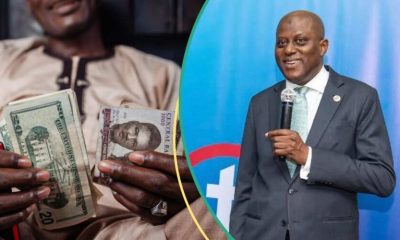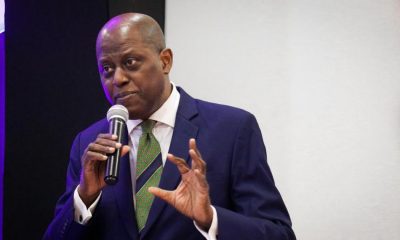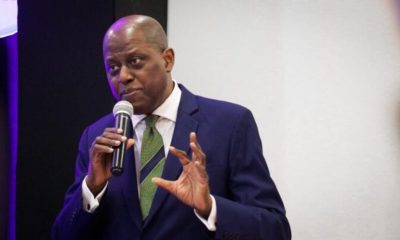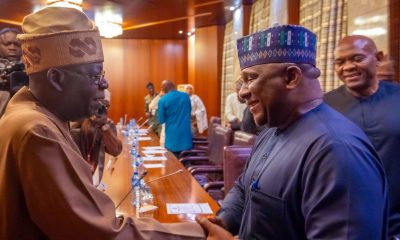ICT
Broadband infrastructure, forex needed for the survival of ICT – Experts
Published
8 years agoon
By
Olu EmmanuelExperts in the telecom sector have called on government to improve on its critical broadband infrastructure, power, and access to forex and finance if the industry, which contributes 11.3 per cent to the nation’s Gross Domestic Product (GDP) must survive and thrive.
Industry stakeholders revealed that the absence of these enablers threatens the N1.5 trillion industry and by extension, the $502 billion Africa’s largest economy by GDP.
President, Association of Telecommunications Companies of Nigeria (ATCON) Olusola Teniola is of the need for government to realise the importance of the ICT sector and “focus on broadband infrastructure and penetration”.
According to him, “First among other things is the realisation that ICT is a critical sector to the growth of our economy. It was the only sector that consistently contributes positively to the GDP on a year-on-year basis. The other high for 2017 is that despite the macroeconomic challenges that besieged the nation, our members were able to provide 24/7 services to the 139 million active subscribers without any major outage recorded in 2017 that negatively impacted the consumers.
“2018 is a critical year for Nigeria’s ICT growth and the rewards that can be gained by the nation in terms of increased productivity, efficiency and increased employment of our youth. The main areas that ATCON expects more focus and effort is in the area of broadband infrastructure and penetration: this is the year (2018) when we need to have implementable programmes in place to ensure we are on track to achieve the 2013 Nigerian National Broadband Plan (NBP) of 30% broadband penetration by end of 2018.
Government alluded in the tail-end of 2017 that they were willing to deploy 18,000 Km of optic fiber in the country. The industry needs all government agencies in charge of and responsible for infrastructure at state level to work with and support the roll-out of this much needed fibre optic that provides metro infrastructure that supports the whole eco-system to deliver on the promises made in the NBP,” Teniola said.
He further said that the industry needs government policies in place that will attract much needed investments to support the capital expenditure programmes that needs to be undertaken to realise the country’s vision of a digital transformation (smart cities, e-Government and Internet of Things).
Speaking on the development, Prof. Umar Garba Danbatta, the Executive Vice Chairman of the Nigerian Communications Commission (NCC) called on state governments for implantation of harmonised Right of Way (RoW) charges resolution of National Economic Council.
According to Danbata, Nigeria needs over 120,000 km of fibre network to boost broadband, saying that only 38,000 kilometers have been covered so far across the country. This is as he called on the Federal Government to ensure that all the 36 states of the federation adhere to the resolution of National Economic Council on the Right of Way charges, which stipulates N145 per meter for laying fibre network in every part of the country.
“The Right of Way issue is something that refuses to go away despite the existence of a document guiding what should be charged. Currently, nobody is complying with the provision of that document,” he lamented.
Speaking further, Danbatta said: “We cannot compel the state governments to charge N145 per meter for fibre. The Federal Government can, however, meet with the governors and extract a commitment from them, to ensure that NEC’s provision is strictly adhered to.”
The NCC boss also called for more Information and Communications Technology (ICT) capacity building in the country in order to fully take advantage of the digital transformation that is taking place in the world.
He argued that while Nigeria strives to build the needed ICT infrastructure, the efforts will be in vain “if there is no critical mass of ICT adoption and use to drive the digital revolution”.
Stakeholders consider the issue of power a recurring decimal over the years. They say that in 2015, telecommunications tower operators were spending some N175 million every day on diesel, which is used to power generators at their towers housing base transceiver stations (BTS) that make it possible for Nigerians to use GSM service to make and receive calls.
More so, each generator was consuming 50 litres of diesel per day. The situation has not been better; especially as public power system continues to be highly erratic.
It was learnt that this quantity of diesel consume by generators at different towers cost tower operators about N175 million at diesel pump price of N140 per litre. The amount is definitely higher now that diesel sells for between N200 and N220 per litre.
Mr. Sung Yoon, the Chief Executive Officer of Samsung Electronics Africa, this is among the reasons why the Korean Chaebol has not established a manufacturing plant in Nigeria.
He said that the company’s smartphones market size in South Africa is 80 per cent, but is lower in Nigeria.
According to him, “Other issues that affect the building of manufacturing plant in the country are infrastructure, Return On Investment (ROI) and grey market. We are trying to be a local company here. Building factory depends on return on investment and efficiency of the economy.”
According Engr. Gbenga Adebayo, Chairman, Association of Licensed Telecommunications Operators of Nigeria (ALTON), Nigerian Telecom Industry is facing a lot of challenges, including finance, the government is not addressing.
“Recurring cases of telecom site’s closure by government agents, states treating the industry as an extractive industry and imposing myriads of taxes on ALTON members and closing down their base stations arbitrarily are some problems facing the industry’s stakeholders.
“The focus should actually be on how to enforce telecom infrastructure as ‘Critical National Security’ as provided by the cyber crime law of 2015. We should expect to see more companies leave the country as long as the Nigerian government doesn’t fix the tax and security challenges faced by companies in the industry,” Adebayo stated.
In less than two decades, the 31 members in ALTON were reduced to less than 15. The telecom industry is actually over-hyped and several operators are going under by the day due to financial challenge. The latest victim on the roll is 9mobile (formerly Etisalat), which is currently embroiled in acquisition process.
Dr. Leo Stan Ekeh, Chairman of Zinox Group and serial digital entrepreneur, advised the government to support the ICT industry by providing the requisite enabling environment. He said that with the provision of the right kind of investment in technological platforms and the overwhelming support of the government, Nigeria can effortlessly produce global billionaires from the Information and Communication Technology (ICT) sector.
He said he is confident that with significant investment in ICT, the challenge of youth unemployment, inadequate opportunities and growing restiveness among the youth can be arrested.
In his words: “The miracle of ICT is that it is the only profession in the world today that can make the child of a poor man the richest man in the world. The challenge, however, is that majority of our youths are in a closed community in which the standards are still poor so they cannot exhibit their innate intellectual strength. As a result, they are seen as defeated and a lot of them are unemployed.”
You may like


Dangote refinery’s new fuel distribution scheme targets inflation, Job creation


CBN FX intervention responsible for Naira appreciation at parallel, official market—analysts


CBN lifts forex restrictions on importation of milk, other dairy products


FX remittances quadruple to $1.3 billion in February – CBN


We’ve paid another $400m to settle verified requests, says Cardoso


FX crisis: Rabiu, Abiodun, others open up on discussions with Tinubu
Trending

 Business1 week ago
Business1 week agoNaira mixed across markets as official window dips, parallel market strengthens

 Football1 week ago
Football1 week agoUCL Playoff: Gordon scores four as Newcastle thrash Qarabağ 6-1

 Entertainment6 days ago
Entertainment6 days agoSinger Simi faces backlash after TikToker admits to false rape allegation

 Entertainment3 days ago
Entertainment3 days agoSimi addresses resurfaced 2012 tweets amid online backlash

 Business1 week ago
Business1 week agoThree Crowns Milk launches nationwide Ramadan campaign to promote heart-healthy nourishment

 Latest1 week ago
Latest1 week agoTinubu defends electoral reform, downplays mandatory real-time upload

 Comments and Issues6 days ago
Comments and Issues6 days agoNigeria’s Declining Oil Output and Soaring Foreign Portfolio Investment Inflow

 Business6 days ago
Business6 days agoPENGASSAN warns Tinubu’s executive order on oil revenues could jeopardise 4,000 jobs

